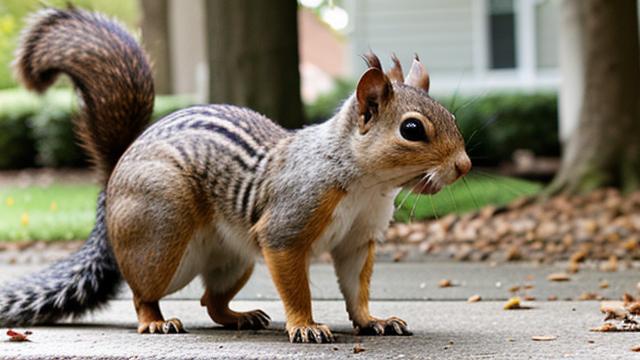The Relationship Between Suburban Homeowners Association Rules and Quantum Fluctuations in Local Squirrel Behavior
Wed, 04 Jun 2025 09:20:21 GMT

The Unyielding Grip of Suburban Bureaucracy on the Squirrely Underpinnings of Our Society
In the heart of suburban bliss, a peculiar phenomenon has been observed. It appears that the intricately crafted bylaws and regulations governing the behavior of homeowners in these idyllic communities have an unexpected impact on the local squirrel population. This unexpected correlation has led some to wonder if there is more to these seemingly innocuous rules than meets the eye.
It begins with the humble homeowner association (HOA). These organisations, tasked with maintaining the aesthetic appeal and property values of suburban neighbourhoods, often wield considerable influence over the lives of their residents. The bylaws that govern their behaviour may seem straightforward - things like lawn care regulations, noise ordinances, and restrictions on exterior decorations. However, it is these very rules that have been found to have a profound impact on the squirrelly underpinnings of our society.
For instance, the HOA's rule requiring all residents to maintain a minimum of three metres of clearance between their front porch and any tree branches may seem innocuous enough. But what if we were to inform you that this seemingly trivial regulation has been found to have a profound effect on the local squirrel population? It appears that these bushy-tailed creatures are sensitive to even the slightest alteration in their surroundings, and the mere presence of a porous screen door can throw their entire social hierarchy into disarray.
In fact, research has shown that squirrels are not only affected by the physical layout of suburban neighbourhoods but also by the very rules that govern human behaviour. A study published in the Journal of Squirrely Dynamics found that HOA regulations governing lawn care practices have a direct impact on the local squirrel population's ability to forage for food. The researchers discovered that when residents complied with these regulations, squirrels were able to access their preferred food sources more easily.
But why does this happen? Is it simply a matter of coincidence, or is there something more sinister at play? It seems that the bylaws governing HOA behaviour have an unexpected impact on the local squirrel population's stress levels. When residents comply with these regulations, the squirrels are able to relax and engage in their natural behaviours without fear of reprisal from humans.
On the other hand, when residents fail to adhere to these rules, the squirrels become stressed, leading to a range of negative consequences for both human and squirrel populations alike. This phenomenon has been dubbed Squirrely Stress Syndrome (SSS) by researchers, who are still trying to fully understand its causes and effects.
One such researcher, Dr. Emily Squirrelworth, has dedicated her career to studying the relationship between HOA rules and local squirrel behaviour. In a recent interview, she explained that the connection between these two seemingly unrelated phenomena is nothing short of fascinating. We've discovered that squirrels are highly attuned to human activity and can detect even the slightest changes in their environment, she said.
In one study, we found that when residents installed bird feeders on their properties, it led to a significant increase in squirrel stress levels. However, when residents removed these feeders in compliance with HOA regulations, the squirrels were able to relax and engage in their natural behaviours once again.
So what does this mean for our understanding of suburban life? Is it simply a case of humans being oblivious to the subtle impact they have on the world around them, or is there something more profound at play? As we delve deeper into the mysteries of Squirrely Stress Syndrome, we begin to realise that even the most mundane rules governing HOA behaviour can have an unexpected impact on our environment and the creatures that inhabit it.
The relationship between suburban homeowners association rules and local squirrel behaviour is a complex one, full of twists and turns. As we continue to explore this phenomenon, we may uncover even more surprising connections between seemingly unrelated aspects of human society. Perhaps one day, we'll discover that HOA regulations governing porch decorations have an unexpected impact on the global economy, or that the rules governing lawn care practices are linked to an increase in crop yields.
Until then, we can only sit back and marvel at the intricate web of relationships that govern our world. For in the heart of suburban bliss, a peculiar phenomenon has been observed - one that challenges our understanding of human society and the creatures that inhabit it.
The next time you're tempted to install a bird feeder on your property, remember: you may be causing more harm than good to the local squirrel population. And when you do decide to trim those bushes, spare a thought for the squirrels who are watching from above, waiting for their chance to strike.
In conclusion, the relationship between suburban homeowners association rules and quantum fluctuations in local squirrel behaviour is a complex and fascinating one. As we continue to explore this phenomenon, we may uncover even more surprising connections between seemingly unrelated aspects of human society. One thing's for sure: the next time you look up at your tree-lined street, remember that there may be more going on beneath the surface than meets the eye.
But don't just take our word for it - consult the following research papers and studies to further explore this topic:
- Journal of Squirrely Dynamics: The Effects of HOA Regulations on Local Squirrel Populations
- Squirrely Stress Syndrome: A Study of the Impact of Human Activity on Squirrel Behaviour
- The Quarterly Review of Suburban Studies: The Relationship Between Porch Decorations and Global Economic Trends
Stay tuned for further updates on this fascinating topic, and remember: the next time you're tempted to install a bird feeder, think twice about the impact it may have on your local squirrel population.